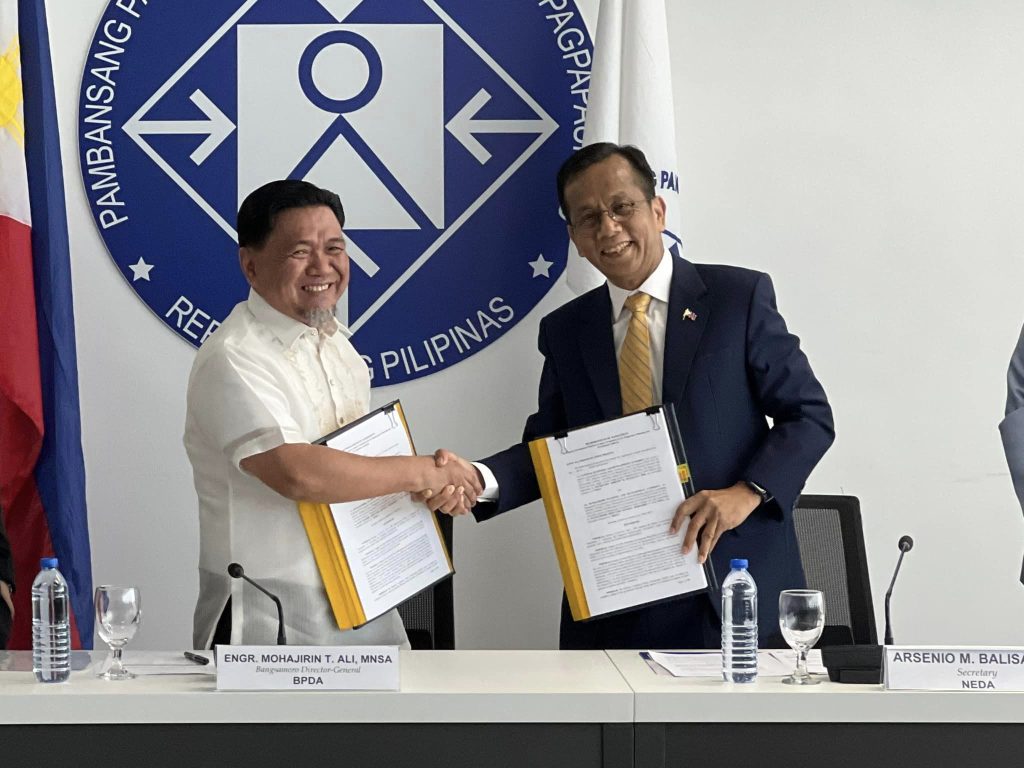
MANILA — In a significant move towards strengthening local expertise in impact evaluation, the National Economic and Development Authority (NEDA) and the Bangsamoro Planning and Development Authority (BPDA), the counterpart agency in the Bangsamoro Autonomous Region in Muslim Mindanao (BARMM), signed a memorandum of agreement (MOA) on Monday, May 20.
The MOA was formally signed at the NEDA Central Office by Secretary Arsenio M. Balisacan of NEDA and Bangsamoro Director General Mohajirin T. Ali of the BPDA. This agreement marks a pivotal step in the government’s continuous efforts to strengthen its programs and projects in the BARMM.
The capacity development program on impact evaluation, a key component of the MOA, aims to augment BPDA’s ability to assess local service delivery within BARMM. The program will focus on attribution in project or program evaluation, ensuring that interventions significantly contribute to the region’s developmental goals.
Balisacan emphasized, “The agreement we are signing today transcends a mere document. It paves the way for learning, sharing, and collaboration among M&E [monitoring and evaluation] practitioners. It equips our institutions with the necessary skills and experience to conduct rigorous impact evaluation studies that will directly benefit our community.”
The MOA is supported by the NEDA-United Nations Development Programme Strategic Monitoring and Evaluation Project. This project seeks to facilitate a more effective evaluation of programs and projects under the Philippine Development Plan (PDP) 2023-2028 and the Public Investment Plan at both national and sub-national levels.
As part of the agreement, NEDA provided technical training to BPDA personnel, enabling them to gain a comprehensive understanding of impact evaluation principles, theories, designs, tools, and methodologies. This training shall further enhance their skills in the preparation, design, and management of such evaluations.
“The robust evidence generated through this program will inform strategies and plans, embed impact evaluation principles into development planning, and facilitate effective communication of policy recommendations to relevant stakeholders,” added Balisacan.
In addition, NEDA and BPDA is jointly designing and executing impact evaluation studies on selected BARMM programs and projects. This exercise shall provide practical learning experience in the design, conduct, and management of impact evaluation studies. The findings and recommendations from this study will be instrumental in policy decisions and the formulation of new projects within the region.
“The insights from these studies will shape policies and programs within the BARMM, promoting transparency and accountability in government efforts,” the country’s chief socioeconomic planner said.
Balisacan further underscored that enhancing local expertise in impact evaluations will facilitate the effective implementation of both the 2nd Bangsamoro Development Plan (BDP) 2023-2028 and the PDP 2023-2028.
Meanwhile, Ali emphasized the importance of the agreement in assisting the BARMM government to make well-informed decisions based on empirical evidence.
“The capacity development program we are undertaking goes beyond simply enhancing our internal skills and knowledge but will also empower us to co-create solutions. It is a commitment to nurturing a culture of accountability and transparency within our institutions, strengthening the foundations of trust upon which effective governance rests,” he stressed.
The Bangsamoro director general also expressed his enthusiasm about the impact evaluation of specific programs and projects within BARMM, noting that the results of these evaluations will help ensure that the development interventions will be more effective and closely aligned with the development thrusts, priorities, and strategic directions of the Bangsamoro government.
Moreover, Ali affirmed BPDA’s commitment to its partnership with NEDA for evidence-driven governance and policymaking, recognizing the partnership as a catalyst for cultivating shared understanding and broader support for evidence-based decision-making in BARMM.
The capacity development program is slated to run for 15 months.



